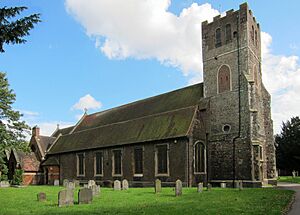All Hallows' Church, Tottenham facts for kids
Quick facts for kids All Hallows' Church |
|
|---|---|
| Parish Church of All Hallows | |
 |
|
| Location | Church Lane, Tottenham, London N17 7AA |
| Country | United Kingdom |
| Denomination | Church of England |
| Churchmanship | Traditional Catholic |
| Website | www.allhallowstottenham.com |
| History | |
| Founded | c. 1200 |
| Administration | |
| Parish | Tottenham – All Hallows |
| Deanery | Haringey |
| Archdeaconry | Hampstead |
| Episcopal area | Edmonton |
| Diocese | London |
All Hallows' Church is an Anglican church located in Tottenham, North London. It is one of the oldest buildings in the London Borough of Haringey. The church was first built around the 12th century as All Saints' Church. Later, in the 15th century, it was given its current name, All Hallows.
This historic church stands right next to Bruce Castle and Tottenham Cemetery. It is believed that King David I of Scotland gave the church to Tottenham. This connection links the church to the Bruce family, who owned Bruce Castle. All Hallows' Church is part of the Diocese of London.
Contents
History and Restoration
All Hallows' Church has a long and interesting history. Over the centuries, it has been an important part of the Tottenham community.
Victorian Era Restoration
Between 1875 and 1877, the church underwent a major restoration. This work was led by a famous architect named William Butterfield. He helped to preserve and improve the church building.
Church in Art
Many artists have been inspired by All Hallows' Church. They have painted it numerous times throughout history. Some of these artists include William Ellis, John Preston Neale, William Henry Prior, John Thomas Smith, Jean Baptiste Claude Chatelain, and even the well-known landscape painter John Constable.
Church Features
All Hallows' Church has several unique features that make it special.
The Church Bells
The church tower holds eight bells. These bells make up the largest set of ringing bells in the entire borough. One of these bells has a fascinating story. It was donated in 1801 by Dr. Humphrey Jackson. For a long time, people thought this bell came from the Quebec garrison. However, detailed research has shown it was actually taken from the Cathedral in Quebec in 1759.
Ancient Yew Trees
In the churchyard, you can find very old yew trees. These trees were brought from Ireland over 1000 years ago. They are a living link to the church's ancient past.
Gallery
 | Chris Smalls |
 | Fred Hampton |
 | Ralph Abernathy |



